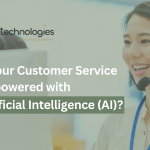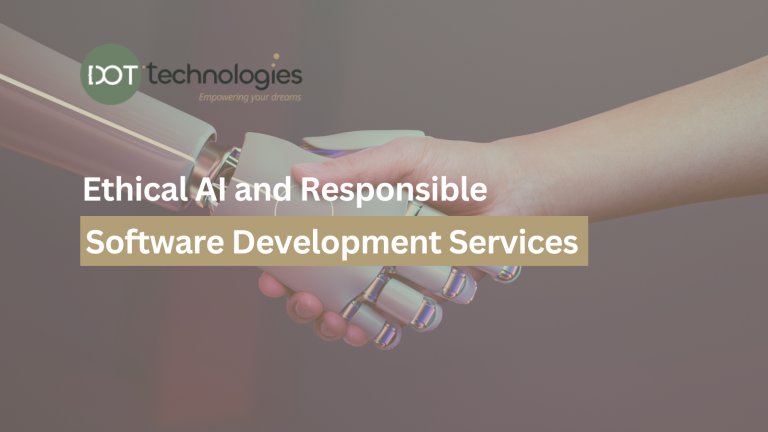The intersection of artificial intelligence (AI) and software development services marks a significant evolution in technology, where the capabilities of machines extend beyond mere computation to include decision-making, learning, and even predicting future trends.
This integration has revolutionized countless industries, making processes more efficient, personalized, and capable of handling complex tasks that were previously unimaginable.
However, as AI systems increasingly mimic human intelligence, ethical considerations and the need for responsible software development become paramount.
Understanding Ethical AI
Ethical AI is all about making sure AI technology does the right thing, treating everyone fairly, and keeping things open and honest. Think of it like teaching AI to be a good citizen. It’s about making sure that when AI makes decisions, it doesn’t accidentally pick favorites based on unfair reasons.
This is important in places like hospitals, police work, and banks, where decisions matter to people’s lives. Plus, as AI starts doing more on its own, we need to make sure it keeps everyone’s stuff safe and sound.
But ethical AI isn’t just about stopping bad things from happening. It’s also about ensuring AI helps out in the best ways possible. For example, in healthcare, AI can help doctors figure out the best treatments for their patients. Or in cities, it can help manage traffic so there’s less pollution and everyone gets where they’re going faster.
The goal is to have AI that not only knows how to do things right but also helps make the world a better place. And to get there, everyone needs to chip in, from the people who make AI to the ones who use it, to make sure it’s being used in a way that’s good for everyone.
Looking for a leading software development company with AI expertise? DOT Technologies is your go-to destination.
The Challenge of Bias
The problem of bias in AI is a significant hurdle in the field of artificial intelligence. This issue doesn’t just pop up out of nowhere; it’s often rooted in the beginnings of an AI system’s life, starting with the data it learns from. Just like people, if AI systems learn from flawed information, their “decisions” can be unfairly skewed against certain groups or individuals. This isn’t just a technical glitch; it can have real-world consequences, leading to unfair treatment and a loss of trust in these technologies.
Tackling this bias isn’t a one-step fix. It involves a thorough approach, starting with making sure the data used to teach AI systems is as diverse and inclusive as possible. But it doesn’t stop there. We also need clear insights into how these AI systems make their decisions, which means pulling back the curtain on the algorithms themselves.
Plus, it’s crucial to keep a constant watch on these systems, regularly checking and adjusting them to ensure they stay fair over time. This ongoing commitment to vigilance and improvement is key to building AI systems that serve everyone fairly and maintain the public’s trust.

Prioritizing Data Privacy
In today’s digital era, where data plays a crucial role akin to a valuable resource like oil, ensuring the privacy of user information stands at the forefront of ethical AI and responsible software development services. The commitment to protecting personal data underscores the need for AI systems and their development processes to be designed with a deep respect for individual privacy rights. This encompasses not just the secure handling and storage of data, but also the ethical collection and processing of information.
This approach not only enhances trust between users and technology providers but also aligns with global data protection regulations, reinforcing the ethical foundation upon which AI systems should be built.
Learn more about software development integrating AI from a reputed software development company. Click here to connect.
Fostering Transparency and Accountability
Transparency and accountability are foundational pillars of Ethical AI. Developers and organizations need to aim for clarity in how AI systems work, ensuring that not only specialists but also the wider public can comprehend their operations. Such openness is key in building confidence, allowing everyone involved—from users to regulators—to evaluate the fairness and efficiency of these AI applications.
Implementing strong data protection measures is a key part of this, involving sophisticated security protocols to prevent unauthorized access and breaches. Additionally, users must be fully informed about what data is being collected and for what purpose, which is where obtaining informed consent comes into play. Beyond just gathering consent, it’s equally important to empower users with the ability to control their data, including the option to modify, export, or delete their information as they see fit.
Moreover, accountability in AI systems is paramount. It is vital to establish clear responsibility for the actions and decisions made by AI, ensuring there’s always a human element in the loop capable of understanding and, if necessary, correcting the course of AI actions. This level of accountability guarantees that, despite the autonomous nature of AI systems, there remains a traceable path back to human oversight.
This not only enhances the reliability of AI systems but also reassures the public that there are checks and balances in place to prevent misuse and address any issues that may arise.
Encouraging Inclusivity and Diversity
In the journey towards creating AI systems that truly benefit everyone, inclusivity, and diversity are not just beneficial but essential. Integrating a wide array of voices and perspectives into software development services integrating AI goes a long way in countering biases and ensuring the technologies developed reflect the diverse tapestry of human experiences and needs. This means actively involving people from various backgrounds, cultures, genders, and professional fields right from the start of the AI development process.
Diversity in AI development doesn’t only help in identifying and mitigating potential biases in AI systems; it also ensures that these systems are more adaptable and can cater to a wider range of scenarios and user needs. By embracing inclusivity, we’re more likely to design AI solutions that are well-rounded and considerate of the multitude of ways people interact with technology, thus making AI more accessible and beneficial for all segments of society.
This inclusive approach not only enriches the software development services but also helps in building AI systems that are truly aligned with the diverse world they are meant to serve.

The Role of Regulation
As AI technologies advance at a breathtaking pace, there’s a growing awareness that the regulatory landscape needs to keep up. Recognizing this, governments and international organizations are stepping up to craft regulations that ensure AI is developed and used in ways that are safe, ethical, and beneficial to society. The goal of such regulations isn’t just to lay down the law but to foster an environment where ethical standards are the norm, and best practices are encouraged, ensuring a balance where innovation thrives while potential harms are mitigated.
These regulatory efforts are crucial for setting a baseline of ethical conduct in AI development and use, providing clear guidelines for developers and organizations. Moreover, they serve as a protective measure for individuals, ensuring that their rights and well-being are safeguarded in the face of rapidly evolving AI applications.
Importantly, the challenge for regulators is to design these frameworks in a way that doesn’t hamper the innovative spirit that drives the field of AI. Striking this balance is key to nurturing an AI ecosystem that is both dynamic and principled, leading to technological advancements that are not only groundbreaking but also aligned with the greater good.
DOT Technologies is Leading the Way in Ethical AI
At DOT Technologies, a leading software development company, we are acutely aware of the profound impact AI can have on society. We are committed to advancing ethical AI and responsible development, embedding these principles into every project we undertake. Our approach is grounded in transparency, inclusivity, and a steadfast commitment to upholding the highest ethical standards. We believe that by fostering a culture of ethical consciousness, we can harness the transformative power of AI to create solutions that are not only innovative but also equitable, sustainable, and aligned with the greater good.
Key Takeaway
In the journey of integrating AI into our lives, the discourse on ethical AI and responsible software development becomes increasingly paramount, extending beyond mere technicalities to encompass the core of our societal ethos. Emphasizing ethical tenets in AI development propels us towards a future where technology not only respects human dignity and fosters equality but also protects our collective well-being.
In this vital endeavor, DOT Technologies, a reputable software development company, emerges as an industry leader, advocating for ethical AI, thereby laying the groundwork for a future where technology is both innovative and inclusive, ensuring benefits for all.
Book a free consultation with our experts today.




